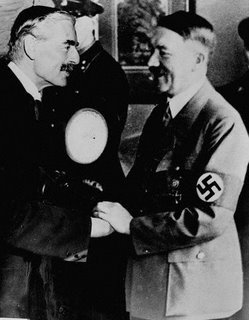 Rummy's splenetic tantrum was instead the kickoff of two weeks of such talk--two weeks of muddled historical analogies, blood libel against their political opponents, and hysterical cries of "Islamo-fascism!" that we can all look forward to as the White House desperately casts about for someone, anyone, to take the blame in the days leading up to the fifth anniversary of the al Qaeda attacks on the Pentagon and the World Trade Towers.
Rummy's splenetic tantrum was instead the kickoff of two weeks of such talk--two weeks of muddled historical analogies, blood libel against their political opponents, and hysterical cries of "Islamo-fascism!" that we can all look forward to as the White House desperately casts about for someone, anyone, to take the blame in the days leading up to the fifth anniversary of the al Qaeda attacks on the Pentagon and the World Trade Towers.And Rich predicts that, having nothing else to point to on the domestic or foreign policy front, this is what they'll be running at us 24-7 between now and the first Tuesday after the first Monday in November: "All Fascism, All the Time."
 Like Keith Olbermann last week, Rich takes time to set the historical record straight after Rumsfeld's deranged tirade. But Olbermann was primarily concerned with cleaning the Rumsfeldian slime off the idea of principled and patriotic dissent. But Rich returns to the record to remind us that the steely-eyed Secretary of Defense, taking the podium to combat "moral or intellectual confusion," is himself, one might say, a man whose allegiance is ruled by expedients:
Like Keith Olbermann last week, Rich takes time to set the historical record straight after Rumsfeld's deranged tirade. But Olbermann was primarily concerned with cleaning the Rumsfeldian slime off the idea of principled and patriotic dissent. But Rich returns to the record to remind us that the steely-eyed Secretary of Defense, taking the podium to combat "moral or intellectual confusion," is himself, one might say, a man whose allegiance is ruled by expedients:Here's how brazen Mr. Rumsfeld was when he invoked Hitler's appeasers to score his cheap points: Since Hitler was photographed warmly shaking Neville Chamberlain's hand at Munich in 1938, the only image that comes close to matching it in epochal obsequiousness is the December 1983 photograph of Mr. Rumsfeld himself in Baghdad, warmly shaking the hand of Saddam Hussein in full fascist regalia. Is the defense secretary so self-deluded that he thought no one would remember a picture so easily Googled on the Web? Or worse, is he just too shameless to care?(And, as a pedantic footnote, Rich is right: That photo of Rummy and the modern-day Hitler is supremely Google-able. This morning I entered the keywords "Rumsfeld Saddam" and got back 28 pages of links to that picture in 0.06 seconds. How much more dangerous would the conservatives' attempts to control and exploit the Internet for their political aims be if they actually understood how it works?)
Mr. Rumsfeld didn't go to Baghdad in 1983 to tour the museum. Then a private citizen, he had been dispatched as an emissary by the Reagan administration, which sought to align itself with Iraq in the Iran-Iraq war. Saddam was already a notorious thug. Well before Mr. Rumsfeld's trip, Amnesty International had reported the dictator's use of torture - "beating, burning, sexual abuse and the infliction of electric shocks" - on hundreds of political prisoners. Dozens more had been summarily executed or had "disappeared." American intelligence agencies knew that Saddam had used chemical weapons to gas both Iraqi Kurds and Iranians.
According to declassified State Department memos detailing Mr. Rumsfeld's Baghdad meetings, the American visitor never raised the subject of these crimes with his host. (Mr. Rumsfeld has since claimed otherwise, but that is not supported by the documents, which can be viewed online at George Washington University's National Security Archive.) Within a year of his visit, the American mission was accomplished: Iraq and the United States resumed diplomatic relations for the first time since Iraq had severed them in 1967 in protest of American backing of Israel in the Six-Day War.
In his speech last week, Mr. Rumsfeld paraphrased Winston Churchill: Appeasing tyrants is "a bit like feeding a crocodile, hoping it would eat you last." He can quote Churchill all he wants, but if he wants to self-righteously use that argument to smear others, the record shows that Mr. Rumsfeld cozied up to the crocodile of Baghdad as smarmily as anyone. To borrow the defense secretary's own formulation, he suffers from moral confusion about Saddam.
Mr. Rumsfeld also suffers from intellectual confusion about terrorism. He might not have appeased Al Qaeda but he certainly enabled it. Like Chamberlain, he didn't recognize the severity of the looming threat until it was too late. Had he done so, maybe his boss would not have blown off intelligence about imminent Qaeda attacks while on siesta in Crawford.
Rich reminds us of another important point: Whenever someone from Team Bush takes center stage to make a historically dubious and ideologically expedient statement, the correct question to ask is not "Why would they make such a historically dubious and ideologically expedient statement?" but rather "Why would they make such a historically dubious and ideologically expedient statement today?"
Americans have notoriously short memories. The White House hopes that by Election Day it can induce amnesia about its failures in the Middle East as deftly as Mr. Rumsfeld (with an assist from John Mark Karr) helped upstage first-anniversary remembrances of Katrina.Rich's essay is going onto the Readings list in the sidebar.

1 comment:
Enough of this tomfoolery!
bn
Post a Comment